For the upcoming U.S. presidential election, celebrity endorsements have been a central persuasion tool for voters. Celebrities help convey the importance of a candidate and make them more appealing to the public. The question of Puerto Rican rapper and singer Bad Bunny’s endorsement is not absent from this conversation. But amid a crucial Puerto Rican referendum and continuing intermittent blackouts on the island, the musician’s focus is on his community and the political circus surrounding the presidential campaigns.
There is a misdirected focus on whether Bad Bunny will endorse a presidential candidate for the 2024 elections, rather than looking at the on-going political situation in Puerto Rico that have necessitated his frontline involvement in the island’s upcoming gubernatorial elections.
Puerto Rico in Hurricane Maria’s aftermath
To understand the crucial issues at stake in the upcoming Puerto Rican elections, you have to go back to September of 2017. When Hurricane Maria hit Puerto Rico, the territory lost access to electricity, many people had limited access to clean drinking water and there was extensive infrastructure damage, including the destruction of homes. According to a George Washington University study, there were 2,975 excess deaths due to the hurricane, but a separate Harvard University study estimates there may have been up to 8,500 deaths. The total damage and loss of life made Hurricane Maria the deadliest and costliest hurricane in Puerto Rico’s history. Many of the hurricane’s impacts are still ongoing. In the months after, Puerto Ricans had difficulties getting power and entered a period of consistent power and water outages that continue to plague the island. A year after Hurricane Maria, Puerto Ricans faced unstable housing infrastructure as people had not received adequate aid from the Federal Emergency Management Agency (FEMA). This resulted in people having to live under tarps.
Delayed disaster relief and struggles to get FEMA aid prolonged the inability for Puerto Rico to rebuild. It was noted that Puerto Rico received disproportionate FEMA aid in comparison to mainland hurricane relief efforts, alongside billions of dollars in aid delayed by then-President Trump and his administration. Prior to the release of recovery funding, Puerto Rico’s case received an unusual extra review of disaster funds. According to a Guardian article, such extra step of a review had never happened before. Trump engaged in contentious sparring with Puerto Rican leaders over the release of government funds for recovery efforts. Trump blamed Puerto Rico for the state it was in after Hurricane Maria rather than taking the necessary steps to ensure allocated disaster funds reached the island within an appropriate timeline. Investigations into the Trump administration found that disaster relief aid to Puerto Rico was intentionally stalled. The American Civil Liberties Union (ACLU) even argued Trump’s response was rooted in approaching Puerto Rico as “second class” citizens. As the 2020 elections drew near, Trump gave $13 billion to Puerto Rico to repair its electrical grid and schools.
Hurricane Maria exacerbated ongoing problems the island struggled with. Unemployment worsened, Puerto Ricans faced increased financial difficulties and a worsened housing crisis. Due to Hurricane Maria, an increasing number of Puerto Ricans, specifically young people, are leaving the territory. It’s causing brain drain and exposing the economic downturns of the island.
Fast forward to 2024, a referendum on Puerto Rico’s independence or possible statehood is on the ballot in the middle of ongoing outages. The status of Puerto Rico seems to be a fixture for the U.S., but for the Puerto Rican people still affected by the fallout of Hurricane Maria, stabilization is their focus.
A post-Hurricane Maria Puerto Rico and Bad Bunny
As Puerto Rico struggled with getting federal aid, political corruption brewed in the territory’s government. Former Governor Ricardo Rosselló was involved in a political scandal and financial corruption surrounding members of his administration. Among the scandalous acts: demeaning hurricane survivors in a series of texts. Revelations of the former Governor’s messages, which also included sexist and homophobic language, led to national outcry for Rosselló’s resignation. For two weeks, Puerto Ricans mobilized mass protests that shutdown a highway and protested in front of the Governor’s residence. Some protesters were met with aggressive responses from police. During the protests, though in the middle of a European tour, Bad Bunny returned to Puerto Rico to participate in protests against Rosselló.
Bad Bunny has been outspoken throughout his music career about the political state of Puerto Rico. Along with protesting against political corruption, he teamed up with other Puerto Rican artists to soundtrack music (“Afilando los Cuchillos”) for the protests, calling for Rosselló’s resignation. The musician’s involvement in the upcoming Puerto Rican elections is rooted in advocating for a Puerto Rico that has not fully recovered from Hurricane Maria, coupled with economic stagnation. Like many Puerto Ricans, Bad Bunny, or Benito Antonio Martínez Ocasio is focused on ensuring the government works on stability and is in the favor of Puerto Ricans.
University of Puerto Rico, Río Piedras Professor Mayra Vélez Serrano considers Bad Bunny to be a part of the “crisis generation.” This would be considered millennials and older Gen-Z Puerto Ricans who have largely experienced Puerto Rico’s economic decline, which leaves some of them having to seek out better opportunities on the U.S. mainland. Martínez Ocasio is well aware of this matter.
A year after Hurricane Maria, Bad Bunny released “Estamos Bien” to honor the victims of the hurricane. “Estamos Bien” was the first song he performed during his U.S. television debut on “The Tonight Show Starring Jimmy Fallon.” He also used the performance to call out Donald Trump’s denial that thousands of people had died due to Hurricane Maria. “El Apagón” is the 16th song and a single off Bad Bunny’s globally acclaimed and Grammy-nominated album, “Un Verano Sin Ti.” The song’s title translates to “The Power Outage,” specifically addressing the state of intermittent blackouts the island lives with. The song discusses not wanting to leave Puerto Rico because it’s home, listing what makes Puerto Rico great while incorporating sound and allusions of blackouts on the island. Most recently, the singer released “Una Velita,” which explores the response of the Puerto Rican people to tropical storms in the aftermath of Hurricane Maria. Lyrically, the song breaks down the instability of the infrastructure and how the Puerto Rican people can no longer depend on the government for aid due to issues related to corruption. In this aftermath, Bad Bunny depicts how Puerto Ricans depend on each other for support and building community relationships to aid each other in the event of another natural disaster.
The billboards
On Sept. 24, 2024, Bad Bunny shared photos of billboards that read, “Votar PNP Es Votar Por Luma,” “Votar PNP Es Votar Por La Corrupción” and “Quien Vota PNP No Ama A Puerto Rico,” which translate to, “To vote for PNP is to vote for LUMA,” “To vote for PNP is to vote for corruption” and “Whoever votes for PNP doesn’t love Puerto Rico.” Though the sentiments expressed on the billboards weren’t unfounded, it was unclear who paid for the billboards.
The PNP is the Partido Nuevo Progresista (New Progressive Party), which is one of two major political parties in Puerto Rico, while the other is Partido Popular Democrático (Popular Democratic Party). PNP was the party of Ricardo Rosselló. The PNP’s political platform is Puerto Rican statehood, an issue that has characterized the relationship between Puerto Rico and mainland U.S. But over the last couple of years, PNP has also become the face of corruption issues in the Puerto Rican government. During Rosselló’s administration, there were documented mishandlings of money. The shadows of corruption issues in PNP, who have held power since 2017, continue to follow the party.
In recent years, the Puerto Rican government privatized the island’s power grid and later started a contract with LUMA Energy to better Puerto Rico’s power grid. The intention was that Luma would reduce blackouts and blackout lengths. The contract was met with backlash from the public then, and outrage has only increased. LUMA’s handling of Puerto Rico’s power grid has led to more frequent blackouts that at some points last for days. Under the private LUMA contract, some households are facing $200 energy bills per month, while LUMA executives earn six-figure salaries. Oversights by LUMA have not been appropriately handled by the government despite protests from Puerto Ricans to cancel LUMA’s contract.
PNP’s current candidate for governor, Jenniffer González-Colón, has not called for canceling the contract but rather more oversight to mitigate ongoing problems. González-Colón, who aligns herself with the Republican Party, is Puerto Rico’s current resident commissioner, which makes her Puerto Rico’s sole U.S. Congressional representative. In this role, she’s led efforts to increase opportunity zones in Puerto Rico. But according to Centro de Periodismo Investigativo (Puerto Rico’s Center for Investigative Journalism) many lobbyists for opportunity zones in Puerto Rico are also González-Colón’s political donors. González-Colón has denied knowledge of consorted lobbying efforts. She’s also been behind getting Puerto Rico Medicaid funding and advocating for hurricane relief in Congress.
González-Colón’s party was swift to condemn the billboards that called out PNP, eventually an official complaint the same day. The complaint was filed on the grounds that it was unclear who was promoting the messaging of the billboards. Soon after, Bad Bunny tweeted: “El PNP utilizando su poder para tratar de callarme. ¿Qué está pasando con la democracia?” (Translated: “PNP is using their power to try to silence me. What is happening with democracy?). To clarify his role in billboards he followed up with another tweet: “Anuncio pagado por Benito Antonio Martínez Ocasio…Un puertorriqueño que si ama a Puerto Rico.” (Translated: “A message paid for by Benito Antonio Martínez Ocasio…A Puerto Rican that loves Puerto Rico”). In the past, there has been contention between Rep. González-Colón and Bad Bunny. The musician has called González-Colón and her previous competitor, Puerto Rican Governor Pedro Pierluisi’s election campaigns a joke. González-Colón has also responded to Bad Bunny by calling the artist’s past attacks on the PNP as engaging in violence.
Bad Bunny’s role in voter registration
There have been difficulties in registering to vote in Puerto Rico. Puerto Rico’s digital platform to register has complications in submitting verification documents, sometimes even freezing or crashing. This poses a barrier for students studying abroad or people unable to register in person due to other commitments. A lack of trust in the Puerto Rican government has led to lowered voter turnout in Puerto Rican elections.
Bad Bunny has spoken out against low voter registration as the gubernatorial elections grow closer. He called voting a tool to protest against government leaders that have led Puerto Rico into its current political state. This is not the first time Bad Bunny has encouraged Puerto Ricans to vote. For his Most Wanted Tour, concertgoers could win free tickets if they showed a voter ID. New data showed that only 25 percent of eligible voters under the age of 21 were registered to vote, but after Bad Bunny’s comments, 300 students registered to vote, despite ongoing power outages at the University of Puerto Rico.
By being present in the 2024 Puerto Rican elections, Bad Bunny is encouraging the Puerto Rican people to vote for candidates and policies that will benefit the island. His positionality displays his hope for a Puerto Rico that is able to move forward and challenge the status quo of election politics in Puerto Rico. The impacts of Hurricane Maria haven’t been remediated and Bad Bunny’s election advocacy centers these concerns. He wants Puerto Ricans to recognize they can use voting to hold government officials who aren’t advocating for the island’s people accountable. Bad Bunny’s engagement is not a passive action of endorsements, but active participation in the election process.
Suzanne Bagia can be reached at [email protected].




















